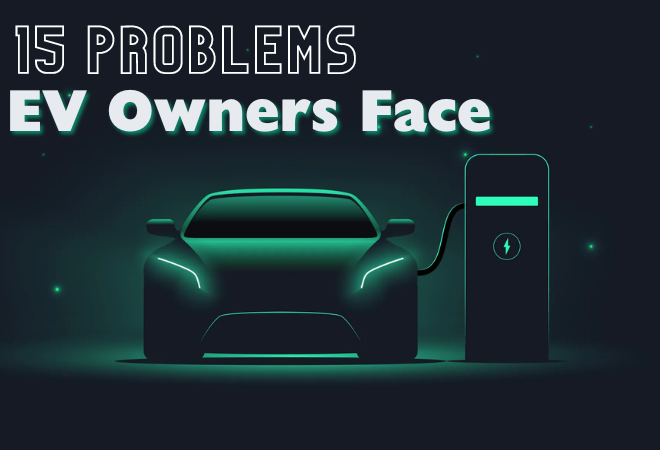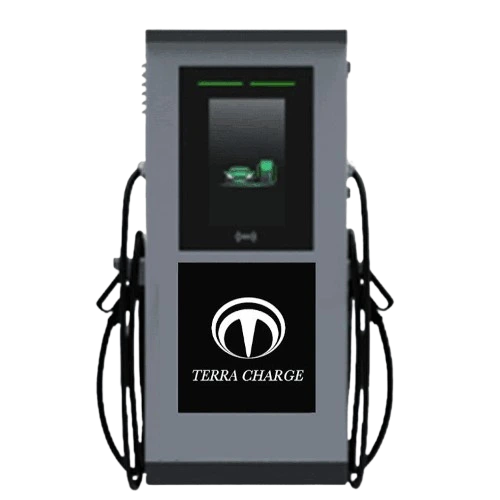The EV sector in India is rising day by day, but the charging infrastructure still has to go a long way to cover the demand and the requirement to make the EV a habit for all, not limited to only EV enthusiasts. So, in this blog, we have covered 15 common everyday problems that EV owners face in charging EVs.
- Lack of Residential Charging Infrastructure
- Limited Availability of 15 Amp Plug Sockets
- Challenges in Extending Wires
- Reliability of Public Charging Infrastructure
- Challenges With Home Charger Installation
- Safety Concerns and Risks of Fire
- Limited Access and Reliance on Specific Locations
- Network Connectivity
- Crowded Parking Space
- Variability in Charging Plug Connectors
- Maintenance and Servicing of EV
- Range Anxiety or Limited Driving Range
- Battery Degradation and Replacement Cost
- Insurance Cost of Electric Vehicle
- Impact of Temperature on Battery Performance
Lack of Residential Charging Infrastructure

Many residential areas need more dedicated EV charging infrastructure, making it inconvenient for EV owners to charge their vehicles home. Without residential charging, owners must rely on external charging stations, which may not always be easily accessible.
Limited Availability of 15 Amp Plug Sockets
The absence of 15 Amp plug sockets in parking areas poses a challenge for EV owners. These sockets are important for overnight charging, and with them, owners may be able to find suitable charging points in their residential parking spaces.
Challenges in Extending Wires
Some societies may not allow the extension of wires from the residence to the parking area, limiting the feasibility of charging for EV owners living on higher floors. This restriction complicates the installation of home chargers.
Reliability of Public Charging Infrastructure

Public charging infrastructure, including fast-charging stations, may face issues such as downtime or non-functional units. This unreliability can create uncertainty for EV owners who depend on these stations for charging.
Challenges With Home Charger Installation
Sometimes, landlords and societies don’t allow the installation of home chargers, which causes uncertainty for EV owners, especially for those who live in rented places.
Safety Concerns and Risks of Fire

Some people are concerned about charging EVs in enclosed spaces due to perceived fire risks. Societal resistance or landlord opposition can hinder the approval of dedicated charging infrastructure.
Limited Access and Reliance on Specific Locations
Limited charging points at shared places like apartments and societies may lead to conflicts among EV owners, and depending on the workplace chargings can limit flexibility.
Network Connectivity
Network connectivity is another issue that EV owners face on an everyday basis, as charging EVs requires network connectivity at both the charger and the mobile app, which the EV owner uses to charge the EV car or any other EV type.
Crowded Parking Space

Due to only 2 connecting guns at every EV charger, the area of parking gets crowded. Unlike traditional cars, which take hardly 2-3 mins to refuel, EV charging can take from 45 minutes to 1 hour, which creates a crowd and also extends the waiting time.
Variability in Charging Plug Connectors
Different EV manufacturers having non-standardized charging plugs can create compatibility problems. EV owners face difficulties that impact their charging experiences.
Maintenance and Servicing of EV
Maintaining and servicing an electric vehicle can create challenges in India due to the limited availability of trained technicians.
EV has distinct types of components in comparison to traditional cars, which demand specialised knowledge and skills for repairing and maintenance of an EV.
The shortage of skilled technicians and the associated costs related to servicing can present difficulties for owners of electric vehicles.
Range Anxiety or Limited Driving Range

Many electric vehicle owners worry about range anxiety. This fear comes from EVs having a shorter range compared to regular cars, leading to concerns about the battery running out during trips.
At present, most EVs in India can travel around 150-200 Kms on a single charge. While this is enough for daily commuting, it becomes insufficient for longer journeys. EV owners planning long trips need to carefully plan routes and make sure there are charging stations available along the way.
Although electric vehicles have seen improvements in their range, they’re still not as much as regular cars. This difference makes people uncertain about widely accepting EVs for long-distance travel.
Battery Degradation and Replacement Cost
Electric vehicle owners often encounter a common issue known as battery degradation. This is the natural reduction in the battery’s capacity over time as it gets used.
As the battery ages, its performance and driving range decrease, impacting the overall driving experience. The speed at which this degradation happens depends on factors like the type of battery, the driver’s habits, and the climate in which the electric vehicle operates. Notably, battery degradation tends to occur more quickly in hot climates.

Replacing a battery can be quite expensive when it is about to reach the end of its life. The cost of replacing an EV battery can range from ₹5 lakhs to ₹10 lakhs. This cost varies based on factors like the type, size, and battery manufacturer.
A wise consideration for EV buyers is to choose a vehicle that comes with a warranty covering battery degradation. This ensures added protection and peace of mind for the long-term use of the electric vehicle.
Insurance Cost of Electric Vehicle
Insurance costs for electric vehicles in India are often higher compared to conventional vehicles, influenced by various factors:
- Limited Insurance Options: There are few insurance companies that offer coverage for electric vehicles in India, which reduce competition and result in higher prices for consumers.
- Higher Repair Costs: The complicated systems of electric vehicles lead to elevated repair expenses that contribute to increased insurance premiums aimed at covering potential repair costs.
- Resale Value Concerns: Electric vehicles in India have a lower resale value compared to gasoline-powered cars. This factor may make insurance companies more cautious in providing coverage, fearing higher financial risks in the event of claims.
Impact of Temperature on Battery Performance
Extreme temperatures, whether really hot or cold, can cause issues for electric vehicle batteries.
In India, where the climate is mostly hot, with temperatures ranging from 25 degrees Celsius in winter to 45 degrees Celsius in summer, this becomes a real concern for EVs.
These high temperatures can harm the performance of EV batteries, making them less efficient and reducing how far they can go on a single charge.












